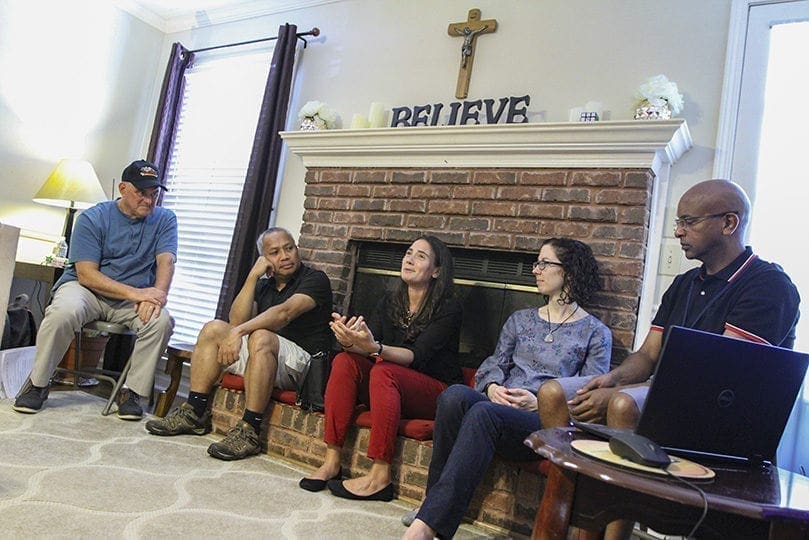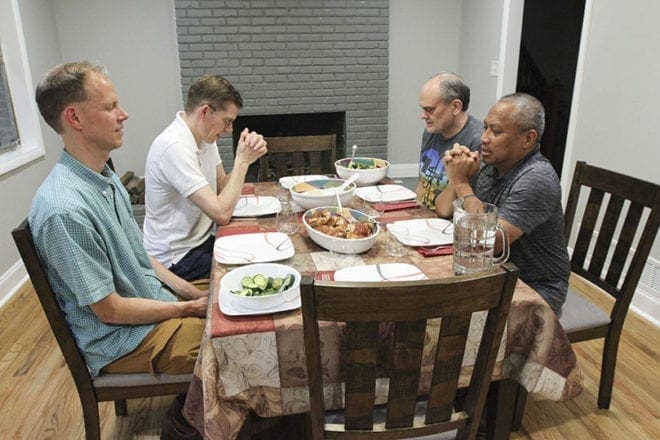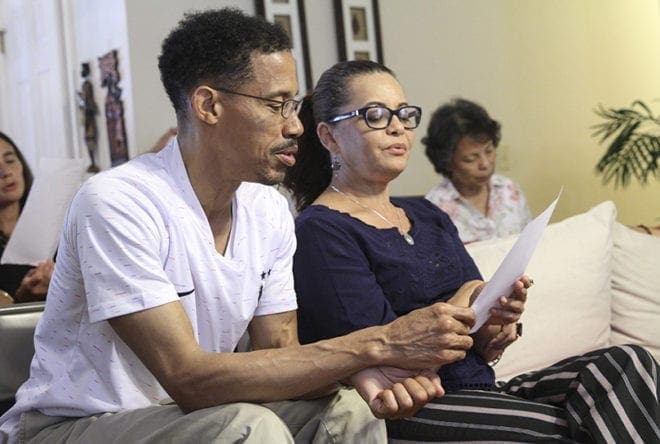 Photo By Michael Alexander
Photo By Michael AlexanderLilburn
Focolare movement emphasizes spirituality of unity
By ANDREW NELSON, Staff Writer | Published September 5, 2019
LILBURN—Saba Ukbai flitted around her kitchen, preparing the potluck dishes filling the center island and offering everyone water as her husband, Tadesse Haileyesus, hugged incoming guests, encouraging them to treat the red brick home as their own.
Not overlooking any details of hospitality, Haileyesus guided a man with a plate heavy with food to sit down and straightened the placemat just so.
“This is Jesus in our midst. Where Jesus is, is love,” Ukbai, a teacher’s’ aide, tells some 20 people crowded in to her home.
The women and men are members of the Focolare movement, which emphasizes a spirituality of unity. The foundation of the lay Catholic organization is one simple idea—people of all faiths, or none, can find common ground and with it comes a sense of belonging and love for each other.
This international movement has been in the Atlanta Archdiocese for a dozen years.
In 2006, a Focolare center for the Southeast opened in the archdiocese. A house of consecrated men recently opened its doors, joining an existing women’s community in metro Atlanta.
Four men of Focolare live in a rented split-level home in Decatur, a little more than a mile from the campus of Emory University. They are all consecrated men taking private vows of poverty, chastity and obedience. They are natives of the United States, Holland, Italy and the Philippines. The group recently shared a dinner of chicken, brown rice, broccoli and zucchini.

(Clockwise, from bottom left) Stephen Schubert, Jean Pierre Slee, Alessandro Turco and Francis Salinel say a blessing before dinner in their Focolare home for consecrated men in Decatur. Schubert, a native of Houston, Texas, is the only U.S. born member of the group. Slee is from the Netherlands, Turco is from Italy and Salinel is from the Philippines. All four men moved to the Atlanta area earlier this year. Photo by Michael Alexander
Stephen Schubert, 48, grew up in Texas. As a young adult, he said he was on a spiritual quest.
“I’ve always sort of been a bridge builder. I loved bringing people together. I didn’t hear any voices, but I had a deep sense of God (saying) ‘I have something more special for you.’”
He was introduced to Focolare and it felt right.
“I jumped in. It was love at first sight,” said Schubert.
A few years later, he pursued his vocation as a consecrated lay member. After training in Italy and Switzerland, followed by living in Chicago, New York and Dallas, he finds himself living in Atlanta. Like all members, he works, and with his background in counseling he’s recently started work in the field. The paychecks are put into a common account to support the house budget and the movement.
The ‘Work of Mary’
Focolare is rooted in a “communitarian spirituality,” he said, which Schubert described as “where we go to God together.”
A fundamental view of the Focolare is an “attitude of openness and deep desire to know the other person. That other person was created as a gift for me and I was created as a gift for that other person,” he said.
Karen Kotara, 57, is a longtime consecrated member of Focolare. She moved to Georgia from Texas to live in the women’s community. She works as a parish secretary at St. Joseph Church, Marietta. As a young person, she was drawn to the immediacy of Focolare spirituality.
“I was blown away because I can live it now,” said Kotara.
As a community, its goal is to reinforce how “God doesn’t see our failures. God sees us starting again,” she said, paraphrasing Focolare’s founder Chiara Lubich.
Ukbai, 51, works as an educational aide at St. John Neumann School, Lilburn. She’s a married member of Focolare with five children. Haileyesus, 52, a statistician at the Centers for Disease Control, is active in the group too. A priest introduced her to the group 30 years ago in her native Eritrea. At the time, with a conflict between her country and neighboring Ethiopia, the need for unity seemed clear, she said.
But here in the United States, she said the same effort toward unity is necessary.
“It helps me be a good mother. It helps me be a good neighbor,” said Ukbai. “It is not about showing, preaching, talking to the other. Instead of telling them, I really try to live it. That neighbor is Jesus. I have to treat that person like I am treating Jesus.”

Hashem Fudaeel, left, a Muslim and a member of Focolare, sings a song entitled “The Treasure” with Sonia Amorim, another Focolare member. Amorim, a native of Brazil, has lived in Georgia for 23 years. She was a Buddhist for 30 years before converting to Catholicism. The theme of the Aug. 17 gathering of Focolare members was “God is our treasure; how do we choose Him?” Photo By Michael Alexander
The Focolare movement took shape out of the ruins of war. In 1943 as World War II wrecked Italy, an elementary school teacher Chiara Lubich, hiding in air raid shelters, came to believe only God’s love could be the antidote to violence. She envisioned a life following Jesus’ prayer “that they all may be one,” drawing on the Gospel of St. John.
Other believers followed. The community became known as Focolare, the Italian word for “hearth,” while it’s officially called “The Work of Mary.”
The process for Lubich’s beatification and canonization began in 2015 and is currently in the diocesan phase.
Focolare members are from all walks of life and all age groups who are drawn to its grounding in a spirit of unity. The movement serves in 89 countries, according to the Vatican, with millions of adherents.
Bridging religious gaps
The group in metro Atlanta gathers monthly to reflect on selected Mass readings and Focolare commentary. Speakers are invited to share how they have tried to live out the group’s mission.
Well known outside the United States, the Foclarini, as members call themselves, are active in bridging religious gaps and fostering interreligious dialogue. One of its deep connections is with the American Society of Muslims, the largest African American Muslim group in the United States.
Gathering in the Lilburn home are Atlanta members of Focolare. They are natives of Italy and Brazil, Colombia and the United States, Eritrea and Philippines, the Dominican Republic and Nigeria. It’s one of the monthly gatherings. They share dishes of Injera, bread from East Africa to dip into lentils, pasta and empanadas.
Hashem Fudaeel, 52, is a Muslim who has a relationship with Focolare dating back to the late 1990s. He organized shared visits to his East Atlanta mosque between Focolare and Muslims in the past. He wants to rebuild those ties. The foundation of love between people is shared among faiths, he said.
“There are so many divisions. We are one humanity. We learn something from each other. That’s the example we need to show for other religious communities,” said Fudaeel, a biologist at a water treatment plant.
As the group shared reflections on a Bible passage, Ruth Ramby played with her toddler son, while also listening to the talk and translating for her mother. Ramby, 31, grew up surrounded by Focolare members in her native Dominican Republic. She attends St. Thomas More Church, Decatur.
“It puts your faith into practice with ways to see and live in the world, to live in harmony and unity,” Ramby said. “For me, it gives you a way to see things a little bit differently.”
The work can be challenging and people aren’t saints, but the Focolare members strive to live in unity, she said.
“It helps you be a good person. It’s a way of living,” said Ramby. “It’s a large family that supports everyone, absolutely everyone.”